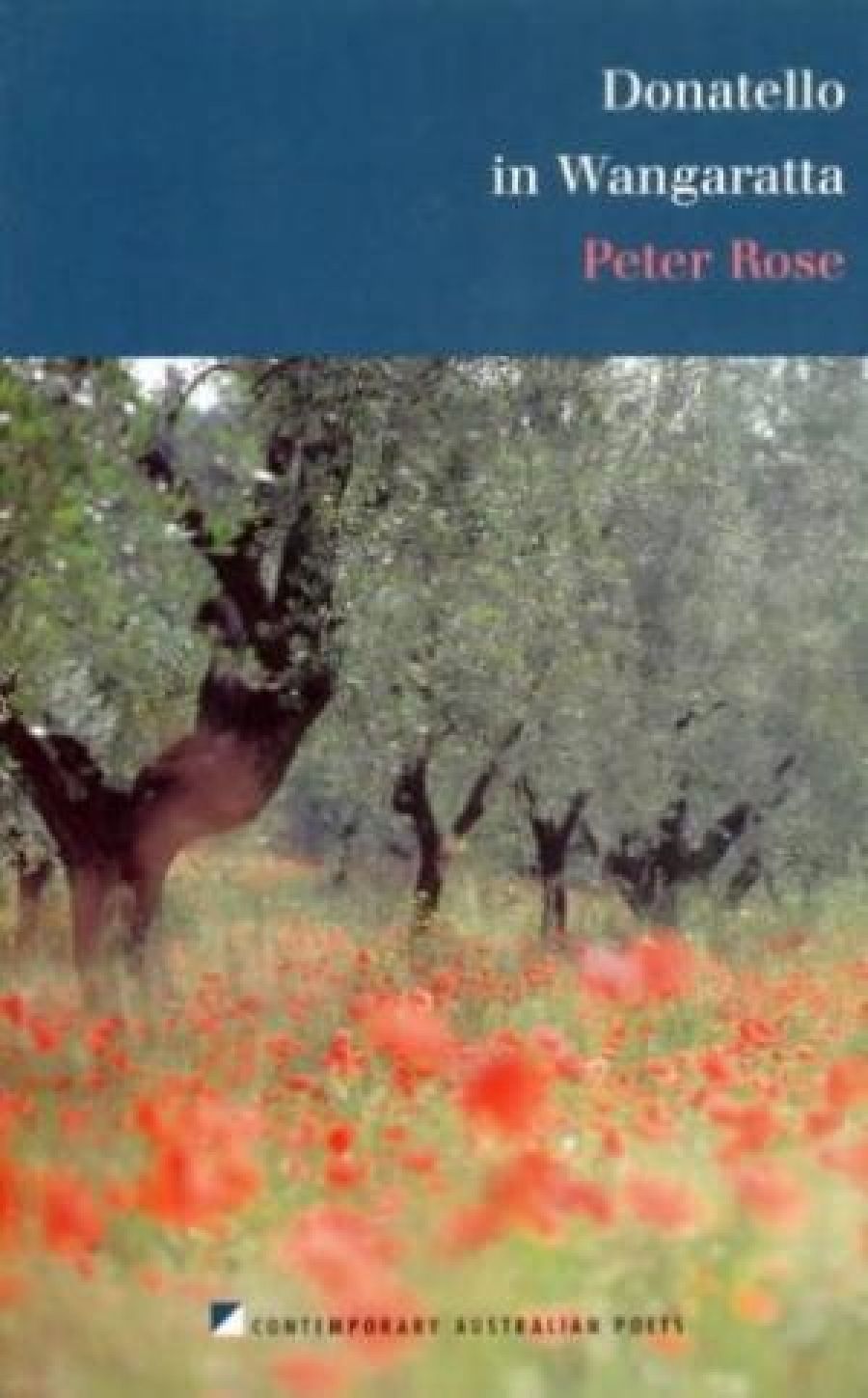
- Free Article: No
- Contents Category: Poetry
- Review Article: Yes
- Article Title: Wangaratta’s Cavafy
- Online Only: No
- Custom Highlight Text: Don Anderson’s description of Peter Rose’s previous collection as having a fin de siècle mood to it, is surely appropriate to his new collection too. There is an air of decadence to Rose’s poetry, but while this may have much larger social implications – it is the end of the century after all – the decadence seems to me to have a more definite testament to offer.
- Book 1 Title: Donatello in Wangaratta
- Book 1 Biblio: Hale & Iremonger, $16.95 pp, 72 pp
- Book 1 Cover Small (400 x 600):

Nevertheless, his view of things is highly theatrical. Typically, his landscapes combine elements of desire and romance with those of violence or death. They gesture with an intensity that tends towards allegory, providing suitably evocative settings for his emotional dramas, while at the same time presenting those settings, and the emotions they embody, as staged, enacted, highly wrought and – to that extent – false. Certainly, the sense is there, of deceit or detachment in even the most intimate and romantic situations –
Last night I wandered in these rooms,
found two vases of gorgeous blooms,
weighting the console where you left them,
leafing the strangeness where you set them,
you whom I never believed …
The scene may be a bar, or a railway carriage, or a hotel room, expressing the transience of the romantic encounter, its moment of passing or recrimination. In ‘Arguments of Rain’, the setting is the garden of a block of flats, garnished with sodden blossoms and a dead possum, where a lesbian couple remonstrate with each other in the death throes of their relationship, while in a flat looking down upon ‘the horrible comedy’ the poet and his lover, ‘aggressively naked’, ‘listen in silent sympathy / befitting our first night, first morning’. The poem is very clear, that the end of their own relationship is implicit at its beginning.
In each of these instances the relationship – anticipated, regretted, or resented – is a homosexual one. The sense of decadence in Rose’s poetry really has its source here, in the ambivalences, the evasions, which complicate homosexual desire, rather than in the decline of civilisation, though it might take that prospect as one of its settings. What strikes one most in Rose’s presentation of these relationships is their impermanence, the mixture in them of longing, betrayal, opportunism, and loneliness. There are, of course, moments of sublimity too, no less theatrical in their framing, as in ‘Aubade’, which begins, ‘And I felt something of that old breeze / sloping through aquatints of morning / wielding comb-like implements of dawn’, and then settles on the figure of a house painter, ‘loping through silken depths of morning, / aware of part of himself, choric and unattainable’. Here, the very fact of distance, of the unattainable, or unretainable, aspects of desire, is given a spiritual dimension. But there’s usually, even in such moments, some element of self-chastening, or worse. Against the sunrise of ‘Aubade’ we might put the sunset of ‘Sitting Ducks’, ‘Glamorously the sun disappears, / though we expect more, always, / and copious moons to filigree doubt, / doubt that haunts like a mohair self.’ Not quite a hairshirt, but close.
This doubt inhabits Rose’s theatricality too, for in its self-conscious artifice, it is essentially decorous, a form of embellishment which questions the very value of what it seeks to express. There’s a similar point to be made about his use of metaphor and emblem, which often, in quite a deliberate way, denies the integrity of the object that is to act as a metaphor in order to make it stand for something wilful or wayward or purely negative in its connotations. In ‘James Merrill’, the poet finds himself somewhat put off by the idea of death. Searching the street for ‘consequence’ – that is, something that might stand as significant in the face of death – he lights on a group of Jewish students ‘pristine for the first day of school’, waiting for their bus. He looks at them and he sees a funeral, which is a grim way of looking at a gathering of schoolchildren, whether they are Jewish or not. But the poet, having offloaded his gloom into his metaphor, feels happy again. ‘I orbit the flat, itinerant as light.’ One is left to wonder what other denials this persona has had to perform in order to remain ‘itinerant as light’.
Rose can be scathing in his character portraits, though it’s always by implication, in the tone of voice, the choice of image, the setting of the scene, so that you find yourself immersed in a point of view that you find more and more uncomfortable – somewhat in the manner of Robert Browning’s creepier monologues. Except that in Rose’s case the portrait is more likely to be of one who presents himself as a victim rather than a perpetrator, a figure who is deceptively torpid in a self-interested way, languid and yet avid, regretting disloyalty but inconstant himself, determined to keep up an elegant front, though constantly reminded of his own lack of worth. In ‘Georgian Dream’, he is someone who, when accused of promiscuity, ‘regrets only the manner of his syntax’. In ‘Domestic’, he is an isolate who finds refuge from the ‘mortal terror’ which has dogged him from childhood, in ‘halva and a good book’. He is an aesthete, in other words, one who savours sensation but refuses the responsibility it might bring in its train. What Peter Rose does in his poetry is use the aesthete’s means to explore the aesthete’s moral limitations, and none more persistently, than the refusal of responsibility.


Comments powered by CComment